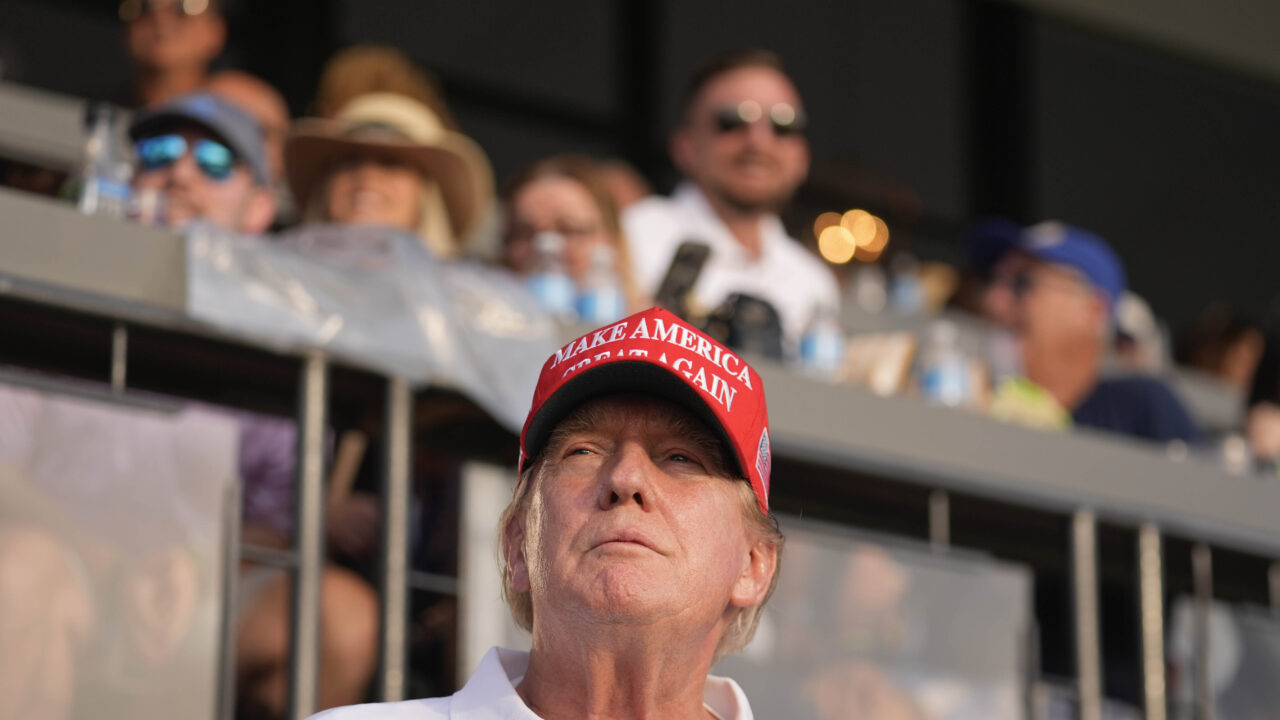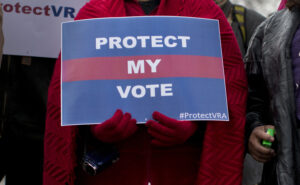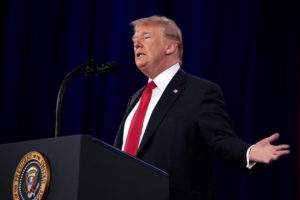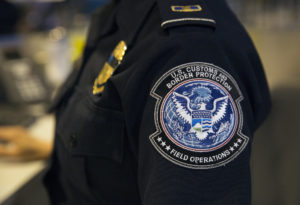Ahead of Ruling, SCOTUS Urged to Reject Trump Immunity Claim
"Trump's legal theory defies common sense and would enable an almost limitless tyranny," warned Public Citizen's president. Republican presidential candidate former President Donald Trump watches play at the 18th hole in the final round of LIV Golf Miami, at Trump National Doral Golf Club, Sunday, April 7, 2024, in Doral, Fla. (AP Photo/Rebecca Blackwell)
Republican presidential candidate former President Donald Trump watches play at the 18th hole in the final round of LIV Golf Miami, at Trump National Doral Golf Club, Sunday, April 7, 2024, in Doral, Fla. (AP Photo/Rebecca Blackwell)
Monday was the deadline for amicus briefs in Donald J. Trump v. United States, and several organizations and experts took the opportunity to urge the U.S. Supreme Court to reject the former Republican president and current candidate’s immunity claim.
Trump is claiming that because he was still in office when he engaged in actions that led to one of his federal indictments, he should be immune from criminal charges for trying to overturn his 2020 loss to Democratic President Joe Biden, which culminated in the January 6, 2021 insurrection.
Lower courts have rejected his argument. The nation’s highest court—which has a right-wing supermajority that includes three Trump appointees and Justice Clarence Thomas, whose activist wife Ginni Thomas was involved in efforts to block Biden’s win—agreed to take the case in February.
Ahead of arguments on April 25, the justices received friend-of-the-court briefs from the ACLU, Citizens for Responsibility and Ethics in Washington (CREW), Common Cause, and Public Citizen as well as coalitions of law professors and constitutional scholars, former government and military officials, national security professionals, historians, and business leaders, among others.
“The former president seeks the power to engage in criminal activity and forever evade the accountability that all others must face.”
“In this case, the former president seeks the power to engage in criminal activity and forever evade the accountability that all others must face,” states the ACLU brief. “At root, it concerns nothing less than whether the United States is a government of laws in which all citizens, including the president, are subject to the nation’s criminal laws, or one in which the president stands immune from criminal prosecution even for blatantly criminal conduct, and even after leaving office.”
As one group of constitutional experts explained: “Trump argues that he enjoys absolute immunity from criminal prosecution for actions committed during his tenure as president, and that his acquittal at an impeachment trial bars his subsequent prosecution. Both arguments reflect a misreading of constitutional text and history as well as this court’s precedent.”
Public Citizen pointed out that “the president has no specific, constitutionally assigned role in the conduct of presidential elections. And any assertion that a president’s authority empowers him to conspire to overturn the result of a valid election and retain power beyond his term in office would be absurd.”
“Accepting a view of the outer limits of presidential authority that would sweep in a conspiracy to overturn an election and remain in office unlawfully would have exceptionally broad implications and threaten severe damage to our constitutional democracy,” the watchdog warned. “Criminal prosecution… is the sole mechanism for holding an unscrupulous president accountable for unlawfully attempting to hold on to power.”
As the group’s president, Robert Weissman, summarized in a statement: “Trump’s legal theory defies common sense and would enable an almost limitless tyranny. Nothing in the Constitution—which aims to prevent tyranny—supports Trump’s theory.”
The retired military leaders—including several admirals and generals—said that “the notion of such immunity, both as a general matter, and also specifically in the context of the potential negation of election results, threatens to jeopardize our nation’s security and international leadership. Particularly in times like the present, when anti-democratic, authoritarian regimes are on the rise worldwide, such a threat is intolerable and dangerous.”
The group of national security experts similarly stressed that Trump’s “broad view of immunity would imperil U.S. national security, weaken the authority of the president, and throw confusion into the chain of command of the armed forces, which the president, as commander-in-chief, commands.”
“Criminal prosecution… is the sole mechanism for holding an unscrupulous president accountable for unlawfully attempting to hold on to power.”
“This court must unequivocally reject the proposed doctrine of presidential immunity and leave no doubt in the minds of petitioner, the public, and all future occupants of the Oval Office that the president, like all individuals subject to the reach of the U.S. legal system, is not above the law,” they continued.
Noting another global impact of the court’s decision, the Leadership Now Project wrote that “American business leaders depend upon the rule of law as the anchor of stability and predictability in our economy.”
“If criminal conduct by our highest officials goes unchecked and the rule of law is subverted, the conditions necessary to sustain the orderly free market that drives American prosperity and its economic competitiveness are destabilized,” the group added. “If the challenged conduct was allegedly committed by a former president while in office, this fundamental threat is exacerbated. In this context, it is existentially important to uphold as unshakeable the sacrosanct American principle of equality and accountability under law.”
In addition to the broad arguments and warnings, some groups highlighted specific issues that have come up. For example, CREW pointed out that Trump supporters are asking the high court to “find Special Counsel Jack Smith’s appointment invalid.”
“This court lacks jurisdiction to consider that issue now and reaching it prematurely would compromise foundational public interests,” said the organization. “Further, the special counsel’s appointment is clearly valid.”
After Trump confirmed he was running for president again, U.S. Attorney General Merrick Garland, a Biden appointee, selected Smith to oversee the probes that led to the election interference case and another federal case involving classified documents.
Smith on Monday submitted a 66-page brief arguing that “a bedrock principle of our constitutional order is that no person is above the law—including the president. Nothing in constitutional text, history, precedent, or policy considerations supports the absolute immunity that petitioner seeks.”
Along with the federal cases, Trump faces two state-level criminal cases: one in Georgia related to 2020 election interference and another in New York, resulting from hush money payments during the 2016 cycle. The trial for the latter is scheduled to begin April 15. He also has ongoing civil fraud and defamation cases in New York.
Throughout this election cycle, several groups and legal scholars have argued that Trump is disqualified from holding office again—under the 14th Amendment to the U.S. Constitution—because he engaged in insurrection. After Colorado disqualified him from its primary ballot, the case reached the Supreme Court as Trump v. Anderson.
“With barely six months between the date of oral argument and the election, this court is left with little margin for error.”
The justices last month ruled 9-0 that Congress is responsible for enforcing the relevant section of the amendment against federal officeholders and candidates—leaving a possibility of future legal challenges if Trump beats Biden in November.
Comparing that case with this one, Common Cause wrote Monday that “to date, the court has treated the two cases in dissimilar ways that seem to favor Mr. Trump. In Trump v. Anderson, where a state court had questioned Mr. Trump’s eligibility for the ballot, the court acted decisively to reverse that decision and remove the cloud over his eligibility.”
“In this case, however—where a criminal case against Mr. Trump, involving largely the same underlying facts as in Trump v. Anderson, has been stayed pending resolution of his appeals—the court has appeared to act much more slowly in its decision-making, with the potential effect of forcing Americans to vote on Election Day without knowing whether Mr. Trump is guilty or innocent,” the group added, urging the justices to “decide this case rapidly” so a trial can occur before voters head to the polls.
“With barely six months between the date of oral argument and the election, this court is left with little margin for error,” Common Cause emphasized. “But it does have a last, clear chance to prevent Mr. Trump’s meritless immunity defense from derailing trial. The court should seize that opportunity.”
Your support matters…Independent journalism is under threat and overshadowed by heavily funded mainstream media.
You can help level the playing field. Become a member.
Your tax-deductible contribution keeps us digging beneath the headlines to give you thought-provoking, investigative reporting and analysis that unearths what's really happening- without compromise.
Give today to support our courageous, independent journalists.






You need to be a supporter to comment.
There are currently no responses to this article.
Be the first to respond.